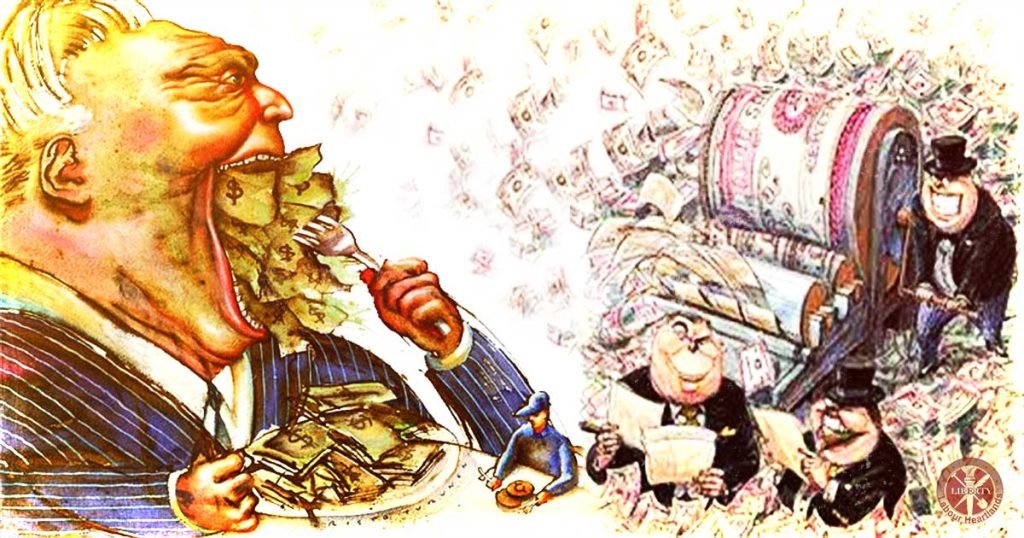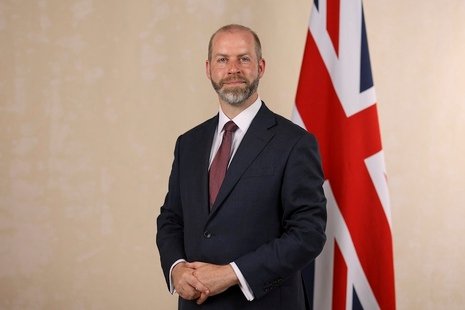BlackRock to Rebuild Britain: When Democracy Becomes a Corporate Ledger
The Illusion of Choice…
Who truly governs Britain? Not Parliament. Not the people. BlackRock…
Gone are the days when political parties offered competing ideological visions. Today, Labour and the Conservatives are not opposing forces—they are rival management teams serving either corporate elites or oligarchic power. Our democratic institutions are now hollowed-out façades, their strings pulled by financial juggernauts like BlackRock.
The Illusion of democratic representation has crumbled. What we’re witnessing is not governance, but corporate colonisation—a bloodless coup executed through boardroom handshakes and political genuflection.
The Labour Party’s transformation is a tragedy of historical proportions. Once the proud standard-bearer of working-class interests, it has metastasised into a neoliberal shell. Under Sir Keir Starmer, the party has completed its grotesque metamorphosis from a vehicle of social justice to a sleek corporate consultancy. Trade union banners have been replaced by corporate PowerPoint presentations. The party that once stood shoulder to shoulder with workers now kneels at the altar of multinational capital, with BlackRock holding the ceremonial knife.
The Conservatives, meanwhile, offer no refuge. Their internal schisms weren’t ideological but a battle between capital’s factions: corporatists clinging to global trade and stability versus oligarchs bent on asset-stripping and chaos. The result? A party gutted of one-nation Tories and reassembled as a front for vulture capitalism, with its hopes for revival now pinned on Reform UK.
Thus, the stage is set: Labour represents corporate capital, while the Tories and Reform champion oligarchic extraction. Both have abandoned the people, turning governance into a puppet show performed for Mammon.
BlackRock’s Vision for Britain: Profits First, Public Second

Last week, BlackRock, the world’s largest asset manager, met with Prime Minister Sir Keir Starmer and Chancellor Rachel Reeves at Downing Street. With $10 trillion under management, BlackRock is more than a financial institution—it’s a shadow government shaping economies and societies across the globe.
The company’s relationship is nothing short of incestuous. Meetings between BlackRock executives and senior government officials have become routine, with an intimacy that breaks all traditional democratic boundaries.
Starmer’s government openly courted this financial titan, with meetings that blur the line between public governance and private lobbying. The cosy relationship was underscored by a congratulatory letter BlackRock sent to Secretary of State for Business and Trade Jonathan Reynolds in July. The message was clear: BlackRock is not just an investment firm; it’s a stakeholder in the UK’s political and economic future.

The letter came as Starmer’s cabinet ministers were appointed in July, hundreds of companies contacted them to offer their congratulations, pitch their value to the government, and request meetings. Inevitably, some had more success than others in obtaining access to their targets. BlackRock was one of them.
At 5pm on Monday 8 July, a managing director at the investment giant emailed Jonathan Reynolds, who’d been appointed the UK’s new secretary of state for business and trade just a few days earlier.
‘On a personal note’…
“Dear Secretary of State,” the executive wrote, “on behalf of all of us here at BlackRock, please find attached a formal letter of congratulations from myself and our UK Chair, Sandra Boss.
“And may I add, on a personal note, it is a pleasure after all these years to address you as such!”
The BlackRock executive was Anthony Manchester, a former senior civil servant who held roles across various government departments between 2001 and 2015, including the Treasury and Cabinet Office.
The attached letter began with the same pleasantries and congratulations expressed by Manchester, before highlighting BlackRock’s broad range of clientele and the scale of their footprint across the breadth of the UK economy, name-dropping British Airways, Rolls Royce and AstraZeneca as investments.
Next came the key point:
“As you know, we also share the government’s view that infrastructure investment can play a critical role in improving economic growth and productivity. We believe infrastructure is poised to become one of the fastest-growing segments in private markets globally.
“As our Chairman and CEO Larry Fink has recently written, private capital market financing, combined with policy pragmatism, are necessary to meet countries’ infrastructure needs and thereby enhance economic growth and productivity.
“We would welcome the opportunity to meet with you to discuss our work on funding the projects and enterprises that drive the economy and building the UK’s case as an investment destination. We will work with your team to get this meeting in the diary.
“Until then, congratulations once again on your appointment.”
When BlackRock’s managing director can casually email a new cabinet minister, when corporate correspondence reads like policy documents, we’ve crossed a Rubicon. The House of Commons is no longer a forum of democratic deliberation but a boardroom for corporate negotiations.
The Price of Partnership

In January this year, Blackrock announced it would purchase Global Infrastructure Partners, which controls around $170bn worth of assets worldwide, including Gatwick Airport and Hornsea 1, a project to build the world’s largest offshore windfarm in the North Sea. This purchase, which was completed last month, reportedly makes BlackRock the second largest asset manager in the infrastructure space, after ‘the vampire kangaroo’, Macquarie.
Critics will argue that when asset managers own significant chunks of infrastructure, their priority is their investors (including sovereign wealth funds and pension funds), rather than society, or even the planet. The primary purpose of infrastructure, the argument goes, becomes the generation of profit, rather than providing a working, reliable service. In practice, this might mean cutting investment while raising prices.
BlackRock and its ilk buying up the UK’s infrastructure would be controversial enough, but the way in which Labour is seeking to encourage this process is even worse. Writing in The Guardian ahead of the general election, economist Daniela Gabor said Labour’s plan for getting back into government amounted to: “get BlackRock to rebuild Britain”.
I would go a step further and state Labour’s strategy of “getting BlackRock to rebuild Britain” epitomises this corporate capture.
Daniela Gabor describes it as a model where taxpayer funds “de-risk” private investments, ensuring corporations reap the rewards while the public absorbs the losses. Essential infrastructure, which governments cannot afford to let fail, becomes a cash cow for financial giants like BlackRock.
She wrote: “Labour’s strategy raises a bigger set of questions about the type of state we want. Starmer’s vision for government-by-BlackRock reduces the question of state capacity to ‘how do I get BlackRock to invest in infrastructure assets?’ This model involves the state in effect subsidising the privatisation of everyday life.”
In simple terms, the government’s plans to use public funds to ‘derisk’ private investment means that the taxpayer takes on much of the risk involved, while the private sector stands to reap most of the benefits. This is particularly true of essential infrastructure, which the government cannot let fail and so must step in to cover losses in the event that something goes wrong.
Gabor continues: “This doesn’t only make it harder to bring public goods back into public ownership; it also allows big finance to tighten the grip on the social contract with citizens, and to become the ultimate arbiter of climate, energy and welfare politics, which will have profound distributional, structural and political consequences.”
The implications are stark. Public goods, from energy grids to water systems, are being privatised and monetised. This deepens the chasm between ordinary people and decision-making power. It’s not about partnership—it’s a corporate coronation.
Starmer’s post-meeting proclamations about “turbocharging growth” and “putting more money in people’s pockets” mask the grim reality: the pockets being filled belong to corporate boardrooms, not working families.
Keir Starmer’s social media posts following the Downing Street meeting championed this partnership, echoing the same language BlackRock used in its communications with Reynolds months earlier. The Prime Minister celebrated BlackRock’s “big footprint in the UK” and its role in “turbocharging growth” but failed to clarify how this growth benefits ordinary people rather than corporate boardrooms.
What we’re witnessing is more than a simple corporate takeover. It’s a fundamental reconfiguration of the social contract. Public goods are being steadily transformed into private assets, with people reduced to mere consumers rather than stakeholders.
Starmer’s proclamations about “partnership with businesses” are nothing more than euphemistic camouflage for corporate capture. When he speaks of putting “more money in people’s pockets,” one must ask: Whose pockets? Certainly not those of ordinary working people.
From Public Good to Private Gain
BlackRock’s investments are not about nation-building or public welfare. They are about turning critical infrastructure into profit machines. The calculus is simple: maximise returns, minimise accountability. Energy, transportation, healthcare, agriculture and land—everything becomes an asset to be monetised.
This isn’t governance; it’s extraction. People are no longer citizens but consumers, subjected to the whims of corporate shareholders. Policies on climate change, welfare, and economic stability are dictated not by democratic debate but by the balance sheets of financial overlords.
The Real Divide: Democracy vs. Corporate Feudalism
The battle we face is no longer left versus right. It is democracy versus corporate feudalism. BlackRock exemplifies a new age of extractive capitalism, where financial titans strip the public of its sovereignty and turn democratic institutions into enablers of profit.
Labour’s complicity in this transformation is a betrayal of its founding principles. The party that once fought for workers now facilitates the commodification of their lives. The Tories, aligned with oligarchic chaos, are no better.
The choice before us is stark. Do we accept this corporate colonisation of our democracy? Or do we fight to reclaim the social contract, demanding a government that serves the people, not the profit margins of multinational financiers?
The time for illusions is over. The battle for Britain’s soul has begun.
Support Independent Journalism Today
Our unwavering dedication is to provide you with unbiased news, diverse perspectives, and insightful opinions. We're on a mission to ensure that those in positions of power are held accountable for their actions, but we can't do it alone. Labour Heartlands is primarily funded by me, Paul Knaggs, and by the generous contributions of readers like you. Your donations keep us going and help us uphold the principles of independent journalism. Join us in our quest for truth, transparency, and accountability – donate today and be a part of our mission!
Like everyone else, we're facing challenges, and we need your help to stay online and continue providing crucial journalism. Every contribution, no matter how small, goes a long way in helping us thrive. By becoming one of our donors, you become a vital part of our mission to uncover the truth and uphold the values of democracy.
While we maintain our independence from political affiliations, we stand united against corruption, injustice, and the erosion of free speech, truth, and democracy. We believe in the power of accurate information in a democracy, and we consider facts non-negotiable.
Your support, no matter the amount, can make a significant impact. Together, we can make a difference and continue our journey toward a more informed and just society.
Thank you for supporting Labour Heartlands









